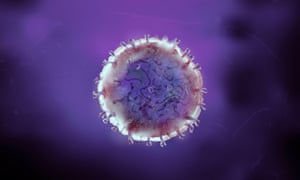British scientists have launched a large study aimed at uncovering the critical role that human antibodies and other immune defenses play in the severity of Covid-19 cases.
The results could support some scientists’ belief in this Antibodies caused by the common cold can protect children from disease. Instead, the study could confirm other researchers’ concerns that some immune responses to the virus could lead to a potentially fatal inflammatory reaction that could sabotage attempts to produce anti-Covid vaccines.
“This study could go in two very different directions,” said Michael Levine, professor of pediatrics at Imperial College London. “It could reveal that the reacting antibodies explain why children are not exposed to severe Covid-19 virus, or it may show that patients’ immune responses cause life-threatening effects.”
The study is being carried out by the Levine Group, a team led by Professor George Cassiotis at the Francis Crick Institute in London, and scientists led by Dan Davis from University College London. They will use the thousands of samples collected as part of existing studies funded by the European Union and Wellcome.
Much of the groups’ work will focus on antibodies, which are the main immune defense proteins that attach to viruses to block their activity. When Covid-19 first appeared, scientists began to search for antibodies to the virus in patients and healthy individuals, and to their surprise, they found them not only in samples taken from newly infected people but in samples collected before the start of the epidemic.
“We discovered that a small group – about 6% of the UK population – actually had antibodies that could recognize the new virus, even though they had never been exposed to it,” Cassiotis said. We have realized that there should be a mutual interaction occurring between the common cold coronaviruses and the new epidemic strain. They are both coronaviruses, after all. “

Coronaviruses cause about a fifth of the common cold in the United Kingdom and the antibodies that result from them latch onto the Covid-19 virus. But can they really prevent Covid activity? “Our laboratory experiments indicate this may be the case,” Cassiotis said. These antibodies may actually protect against Covid-19.
Adults get colds caused by coronaviruses every two or three years. In contrast, children contract it five or six times a year because they infect each other frequently at school, according to Cassiots. As a result, about 60% of them have antibodies to the Coronavirus, ten times the level of adults.
Cassiotis said: “Children generally do not get Covid-19, and I think protection is provided by the interaction of reactive antibodies resulting from recurring colds caused by the Corona virus.”
Crucially, it appears that levels of antibodies to the Coronavirus drop precipitously when children leave school and this is a cause for concern: UK children may have lost immunity during lockdown. “The next coronavirus that will spread among them may be the pandemic strain, not the seasonal cold,” Cassiotis said. “This doesn’t appear to be happening but it is a cause for concern.”
The new Crick-Imperial-UCL study will analyze samples from thousands of people to see if they possess antibodies against Covid and also to determine if they display any other immune reactions that may be caused by coronaviruses, including responses in T cells. It will also study how individuals behave as the epidemic progresses to see how well antibodies protect them.
Cassiotis said that many different types of antibodies are produced by the body’s immune system when disease strikes. Some of them are specific to Covid-19. Others close the divisions common to all coronaviruses – by focusing on these, it might be possible to design a vaccine to protect against all coronaviruses. We will then be better prepared for the next pandemic.
But there are other aspects of the body’s immune response to Covid-19 that could have an entirely different effect. Levin said, “After the epidemic started, we started seeing critically ill children with severe inflammation and multiple organ failure.” We were perplexed that their illness was not occurring at the height of the infection but several weeks later – when the virus was gone but the antibodies were high. We feared it was really the antibodies that were causing the damage. “
Levin added that the culprit may have been a phenomenon called disease-dependent antibody enhancement. The dengue virus is a good example. There are three subspecies of it. If you contract one strain it may not make you severely ill.
But if you later develop a different second strain, you could be in trouble. “Antibodies that your immune system first made can make disease worse when you encounter a slightly different strain of virus.”
This defect affected attempts to develop a dengue vaccine. Stimulating production of antibodies – as vaccines try – can enhance the effect of the disease, unless those antibodies are effective against the three strains of dengue fever.
Levin said he was concerned that the newly recognized childhood inflammatory disease linked to Covid-19 could be due to antibodies that later cause inflammation and organ damage. If so, the vaccine-induced coronavirus antibody may cause a similar problem.
“We need to understand whether the antibodies that children are developing against the common cold coronavirus and Covid-19 virus protect against severe disease, or alternatively, whether some children and adults make antibodies that may make the disease worse. We hope you give us. Our study answers and provides the basic information we need to develop safe vaccines. “






